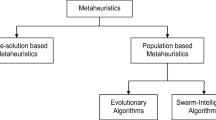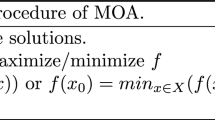Abstract
Symbolic regression is a process to find a mathematical expression that represents the relationship between a set of explanatory variables and a measured variable. It has become a best-known problem for GP (genetic programming), as GP can use the tree representation to represent solutions as expression trees. Since the success of memetic algorithms (MAs (Memetic algorithms (MAs) can be regarded as a class of methods that combine population-based global search and local search [6, 30])) has proved the importance of local search in augmenting the global search ability of GP, GP with local search is investigated to solve symbolic regression tasks in this work. An important design issue of MAs is the balance between the global exploration of GP and the local exploitation, which has a great influence on the performance and efficiency of MAs. This work proposes a GP-based memetic algorithm for symbolic regression, termed as aMeGP (a daptive Me metic GP), which can balance global exploration and local exploitation adaptively. Compared with GP, two improvements are made in aMeGP to invoke and stop local search adaptively during evolution. The proposed aMeGP is compared with GP-based and nonGP-based symbolic regression methods on both benchmark test functions and real-world applications. The results show that aMeGP is generally better than both GP-based and nonGP-based reference methods with its evolved solutions achieving lower root mean square error (RMSE) for most test cases. Moreover, aMeGP outperforms the reference GP-based methods in the convergence ability, which can converge to lower RMSE values with faster or similar speeds.




Similar content being viewed by others
Notes
Weka is a set of machine learning algorithms for solving real-world data mining tasks [11].
References
Al-Betar M A, Aljarah I, Awadallah M, Faris H, Mirjalili S (2019) Adaptive β - hill climbing for optimization. Soft Computing 23(1):13489–13512
Aleb N, Tamen Z (2011) A memetic algorithm for program verification. In: Proceedings of the UKSim 5th European Symposium on Computer Modeling and Simulation, EMS 2011, Madrid, Spain, November 16-18, 2011
Anjum A, Sun F, Wang L, Orchard J (2019) A novel continuous representation of getic programmings using recurrent neural networks for symbolic regression. arXiv:1904.03368
Azad R M A, Ryan C (2014) A simple approach to lifetime learning in genetic programming-based symbolic regression. Evol Comput 22(2):1–30
Bansal J C, Sharma H, Arya K V, Nagar A (2013) Memetic search in artificial bee colony algorithm. Soft Comput 17(10):1911–1928
Boryczka U, Szwarc K (2019) Selected variants of a memetic algorithm for jsp – a comparative study. Int J Prod Res 44:1–16
Burlacu B, Affenzeller M, Kommenda M, Kronberger G (2018) Winkler s.: Schema analysis in Tree-Based genetic programming
Chopard B, Tomassini M (2018) Simulated annealing. In: An introduction to metaheuristics for optimization. Springer, Cham, pp 59–79
Deb K, Poli R, Banzhaf W, Beyer H, Burke E, Darwen P, Dasgupta D (2003) Floreano d.: Genetic and evolutionary computation - GECCO
Dua D, Graff C (2017) UCI machine learning repository. http://archive.ics.uci.edu/ml
Frank E, Hall M A, Witten IH (2016) Data mining: Practical machine learning tools and techniques (fourth edition)
Izadi Rad H, Feng J, Iba H (2018) GP-RVM: Genetic programing-based symbolic regression using relevance vector machine
Koza J R (1999) Genetic programming III: Darwinian invention and problem solving, vol 3, Morgan Kaufmann
Koza J R, Keane M A, Streeter M J, Mydlowec W, Yu J, Lanza G (2006) Genetic programming IV: Routine human-competitive machine intelligence, vol 5, Springer Science and Business Media, Berlin
Krasnogor N, Hart W E, Smith J, Pelta D A (1999) Protein structure prediction with evolutionary algorithms. Available at http://eprints.uwe.ac.uk/11083
Kronberger G, Kammerer L, Burlacu B, Winkler S M, Kommenda M, Affenzeller M (2019) Cluster analysis of a symbolic regression search space. Genetic Programming Theory and Practice XVI 85–102
López U., Trujillo L, Martinez Y, Legrand P, Naredo E, Silva S (2017) RANSAC-GP: Dealing with outliers in symbolic regression with genetic programming. Eur Conf Gene Program 10196:114–130
de Melo V V (2014) Kaizen programming. In: GECCO ’14: Proceedings of the 2014 conference on Genetic and evolutionary computation, pp 895–902
Neri F, Eiben ÁE, Smith JE, Oca MAMD, Cotta C, Sudholt D (2012) Handbook of memetic algorithms
Nguyen Q H, Ong Y S, Krasnogor N (2007) A study on the design issues of memetic algorithm. In: IEEE Congress on evolutionary computation, CEC
Pawlak T P, Krawiec K (2018) Competent geometric semantic genetic programming for symbolic regression and boolean function synthesis. Evol Comput 26(2):1–36
Poli R, Langdon WB, McPhee NF (2008) A Field Guide to Genetic Programming. Published via http://lulu.com and freely available at http://www.gp-field-guide.org.uk, UK
Sabar N R, Aleti A (2017) An adaptive memetic algorithm for the architecture optimisation problem. In: Artificial life and computational intelligence: Third australasian conference, ACALCI 2017, geelong, VIC, Australia, January 31–February 2, 2017
Shao W, Pi D, Shao Z (2017) Memetic algorithm with node and edge histogram for no-idle flow shop scheduling problem to minimize the makespan criterion. Appl Soft Comput 54:164–182
Trujillo L, Z-Flores E, Juarez P, Legrand P, Silva S, Castelli M, Vanneschi L, Schütze O, Muñoz L (2018) Local search is underused in genetic programming. Gene Evol Computation 119–137
Vengatesan K, Bhaskar Ranjana M, Sanjeevikumar P, Mangrule R, Kala V, Pragadeeswaran (2018). Performance Analysis of Gene Expression Data Using Mann–Whitney U, Test ,701–709
Yang Y, Liu Y, Du L, Chang C, Wang D, Wang D (2010) MDE based memetic algorithm using openmp and its application in engineering project scheduling problems with dynamic due dates. In: International conference on logistics systems & intelligent management
Zflores E, Trujillo L, Schuetze O, Legrand P (2014) Evaluating the effects of local search in genetic programming. Springer International Publishing, Cham
Zhang C. Genetic programming for symbolic regression. Available at https://pdfs.semanticscholar.org/e5ee/ddd04b8344fd4f39a5836be686886c80df13.pdf
Zhang K, Cai Y, Fu S, Zhang H (2019) Multiobjective memetic algorithm based on adaptive local search chains for vehicle routing problem with time windows. Evol Intell 3:1–12
Zhong J, Liang F, Cai W, Ong Y S (2018) Multifactorial genetic programming for symbolic regression problems. IEEE Trans Syst Man Cybern Syst PP(99):1–14
Acknowledgments
This study is funded by National Natural Science Foundation of China (grant number 61902281 and 61876089) and Tianjin Science and Technology Program (grant number 19PTZWHZ00020).
Author information
Authors and Affiliations
Corresponding author
Ethics declarations
This article does not contain any studies with human participants or animals performed by any of the authors.
Conflict of interests
Author Jiayu Liang declares that she has no conflict of interest. Author Yu Xue declares that he has no conflict of interest.
Additional information
Publisher’s note
Springer Nature remains neutral with regard to jurisdictional claims in published maps and institutional affiliations.
Rights and permissions
About this article
Cite this article
Liang, J., Xue, Y. An adaptive GP-based memetic algorithm for symbolic regression. Appl Intell 50, 3961–3975 (2020). https://doi.org/10.1007/s10489-020-01745-w
Published:
Issue Date:
DOI: https://doi.org/10.1007/s10489-020-01745-w




